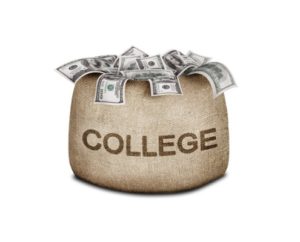College costs are a problem for the vast majority of parents and students because the dollars required to meet school expectations are often far above and beyond what is available in a family’s monthly budget. 
Financial aid is there to close the gap, as schools are quick to point out, but often only the poorest of families are able to secure an amount of need-based aid that will cover college expenses. Needy students make up a small percentage of the college-going population and, far too often, the problem for this group is the lack of awareness of financial aid options, not necessarily the lack of availability of the dollars themselves.
And, many studies show that young people from poor families are, in greater numbers than the rest of the population, not college-ready from an academic standpoint, frustrating those schools that have financial aid dollars earmarked to provide to students from underprivileged backgrounds.
The best way to break the cycle of poverty in America is through higher education. From a pure statistical perspective, the numbers are clear: a college education pays, with those who obtain a B.A. degree earning, on average, more than $1 million more during the course of their lifetime than those who only finish high school.
One of the worst things that could happen in America is for a new, even greater cycle of poverty to result because fewer of our young people, from middle-class economic backgrounds, decide to invest the time and money required for a college degree.
We are afraid that this is already starting to happen with America’s middle class, and that the phrase, “the middle-class squeeze” is becoming all too true in the context of higher education. There is both the reality, and to some degree the perception of reality, that a college degree is not obtainable due to the cost.
This is a reality – and a perception – that needs to change. As the only industrialized nation in the world with a declining college participation rate, we can no longer afford to send a collective message that college is only for the wealthy.
In America, it still is possible for anyone to pursue a college degree, if they are willing to make an academic commitment and the sacrifice of time and money. Together let’s ensure that this ability to work toward a college diploma, a crucial step on the path to success, remains attainable for all Americans, regardless of their financial circumstances.
The poorest of students need academic support and greater financial aid awareness. The wealthiest of students need academic commitment and greater awareness of how fortunate they are. And the middle class student probably needs all of the above, for the surest way to avoid being squeezed is to be fairly bursting with knowledge of where you want to go and how you can get there.
Kathie Boozer is the founder and president of Explore Colleges, a premier college group tour operator. Explore Colleges’ customized tours help students experience the unique cultures, environments, and opportunities on each campus and inspire them to follow their dreams. Contact Kathie at kboozer@explorecolleges.org
